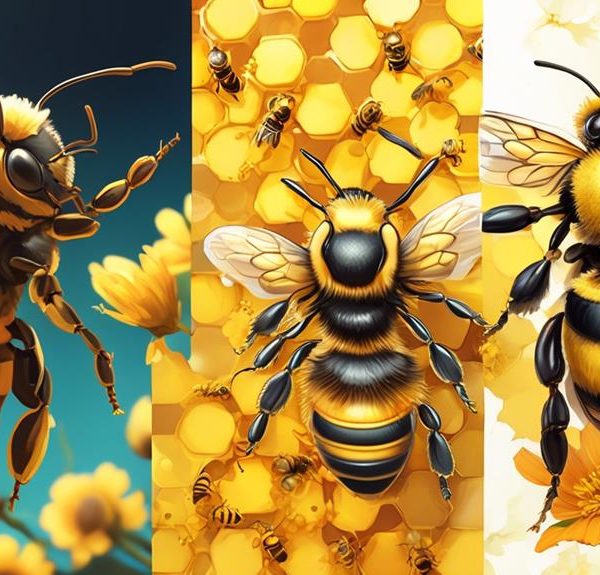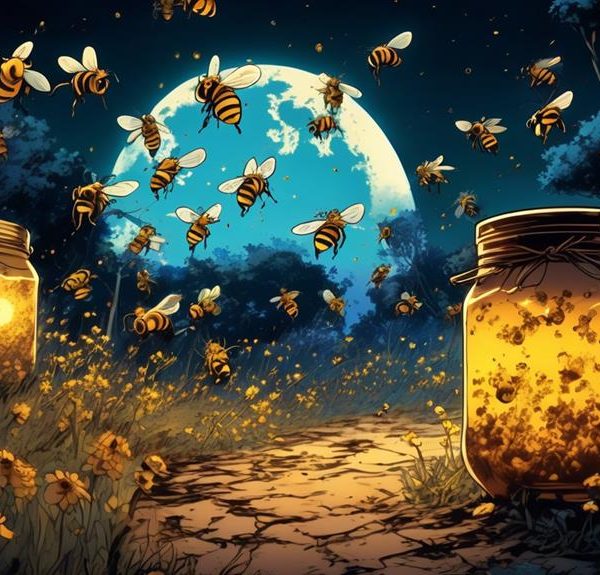Wondering about the surprising intelligence of bees? Dive into the fascinating world of these buzzing problem-solvers.
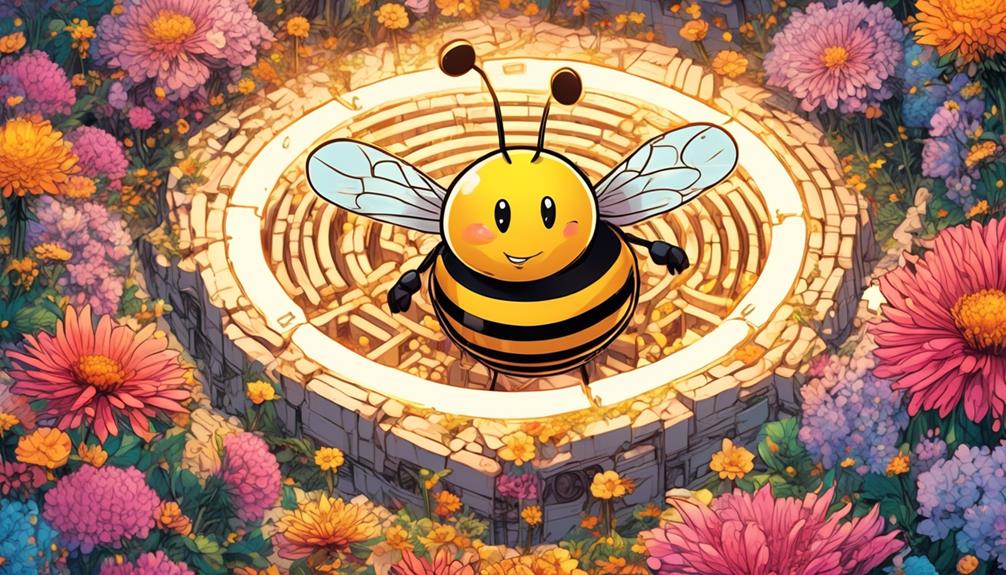
How Smart Are Bees?
In the bustling cityscape of a bee hive, where chaos appears to reign, there exists a level of intelligence that you might find surprising.
You've likely heard about the intricate dance bees perform to communicate the location of food sources, but have you ever stopped to consider what this truly implies about their cognitive abilities?
Bees, it seems, possess a fascinating blend of individual and collective intelligence that enables them to perform tasks and solve problems that would stump many larger, more complex creatures.
However, the extent and nature of their intelligence remains a subject of ongoing scientific inquiry. So, you might wonder, just how smart are these buzzing insects? Let's explore this intriguing question further.
Key Takeaways
- Bees communicate with each other through intricate dances and specific scents, showcasing their intelligence and cooperation within the hive.
- Bees exhibit remarkable problem-solving skills and learning abilities, including understanding the concept of zero, learning from their peers, and comprehending abstract concepts.
- Bees play a crucial role as pollinators, contributing to biodiversity, food production, and the health of ecosystems.
- Recent studies suggest that bees have the ability to understand abstract concepts and transfer knowledge to new situations, further highlighting their cognitive capabilities.
Understanding Bee Communication
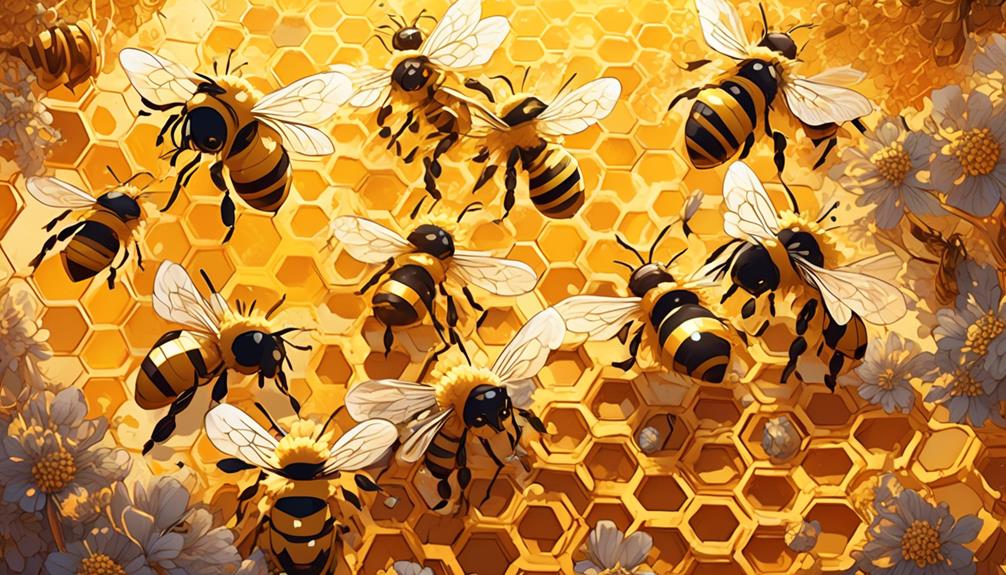
Delving into the realm of bee communication, you'll uncover a complex world where these insects use intricate dances and specific scents to relay information to each other. The core of their communication lies within the 'waggle dance,' a fascinating display where worker bees perform specific movements to convey the location of nectar-rich flowers to the rest of the hive.
In this dance, the bee's direction, duration, and intensity of movement serve as a well-defined map, pointing to the precise location of food sources. The angle of the dance in relation to the sun indicates direction, while the duration of the 'waggle' phase signifies distance. The intensity or enthusiasm of the dance, on the other hand, reveals the abundance of the nectar.
Equally intriguing is their use of pheromones for communication. Bees release specific scents to signal alarm, to point out a good food source, or to guide other bees. These pheromones can cause immediate behavioral changes among the hive members.
Understanding these methods of communication doesn't just underscore the intelligence of bees, but also highlights their incredible cooperation and social structure.
The Hive Mind: Collective Intelligence
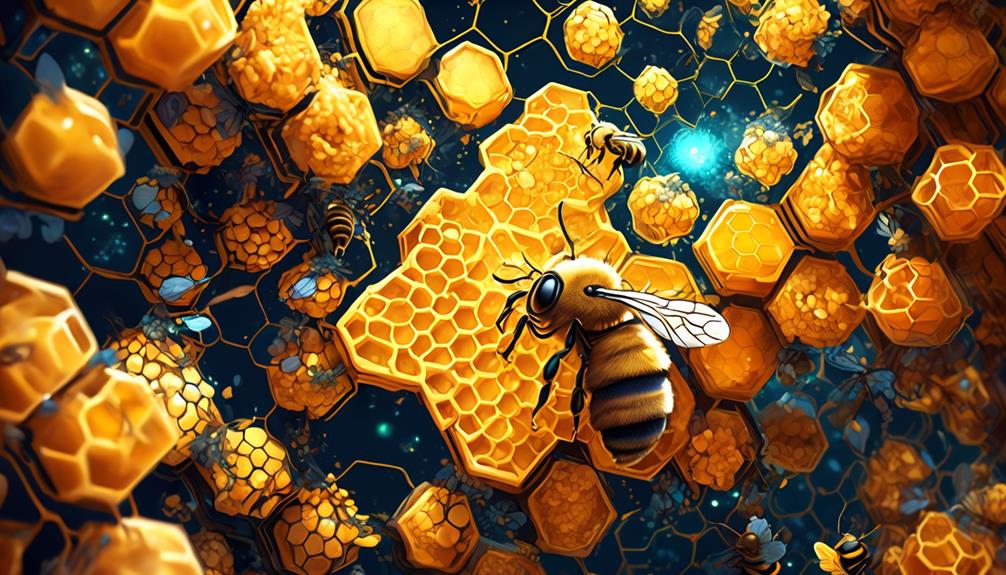
Building on the understanding of individual bee communication, let's now explore the intriguing concept of 'The Hive Mind,' a demonstration of the collective intelligence that allows a bee colony to function as a single entity. The hive mind is more than just bees acting together. It's a complex network of interactions and decisions that lead to efficient foraging, nest building, and colony defense.
Aspect of Hive Mind | Explanation |
|---|---|
Foraging | Bees communicate to find the best sources of food. They perform the 'waggle dance' to tell others the location and distance of a food source. |
Nest Building | Bees work together to build their hive. Each bee has a role, from gathering materials to constructing the comb. |
Colony Defense | The whole colony protects the hive. Bees coordinate to attack threats, driving them away. |
Decision Making | When it's time to relocate, scout bees search for new sites, then communicate their findings. The colony chooses the best site through collective decision-making. |
In this way, the hive mind ensures the colony's survival and growth. Every bee contributes to the collective intelligence, demonstrating that bees are not only individually smart, but also collectively wise.
Bees and Problem-Solving Skills
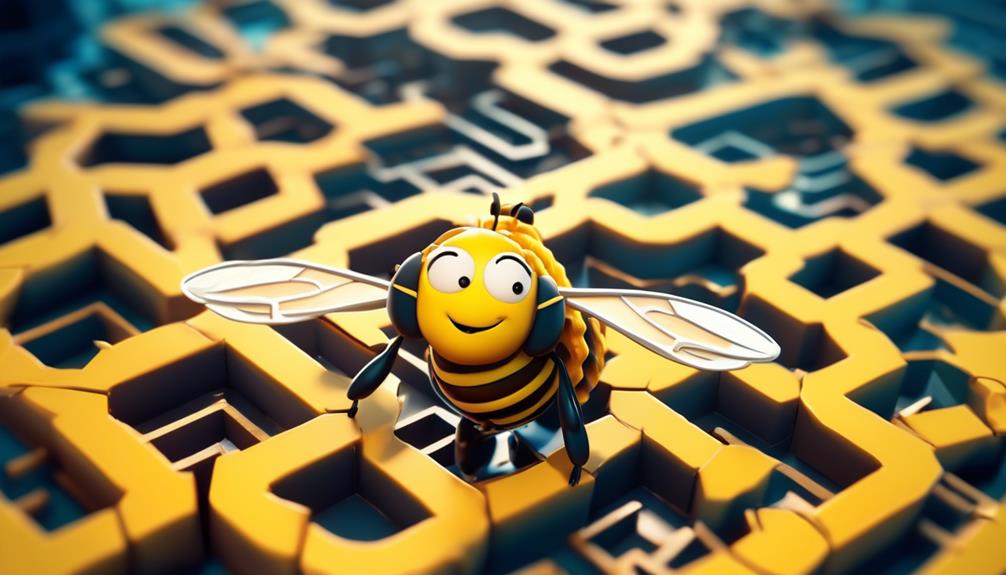
Let's now turn our attention to the remarkable problem-solving skills bees exhibit, further enhancing their reputation as intelligent insects. You might be surprised to learn that bees, particularly honeybees, are capable of solving complex problems that even some mammals struggle with.
Research suggests that bees can understand the concept of zero, a feat that places them in an elite group of animals. They've also shown an impressive ability to learn from their peers. Experiments show that when a bee solves a problem, others quickly pick up the solution.
But, it doesn't end there. Bees can even comprehend abstract concepts like 'same' and 'different,' enabling them to sort images into categories, a skill previously thought to be exclusive to vertebrates. They've also demonstrated an understanding of symbolic language, learning to associate symbols with specific rewards.
These skills aren't just for show. They're essential survival tools. Bees use them to navigate complex environments, find food, and communicate with their hive-mates.
Memory and Learning in Bees
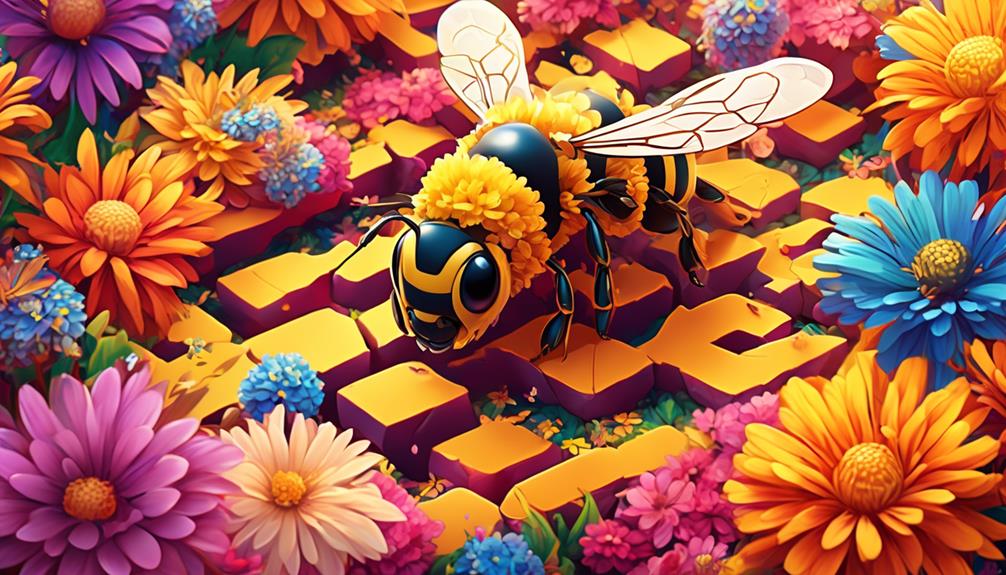
Expanding on these cognitive abilities, bees also exhibit remarkable feats of memory and learning, crucial for their survival and communication within the hive. They're capable of remembering the locations of multiple food sources, recalling their routes for up to six days.
This learning process is facilitated through positive reinforcement. For instance, when a bee discovers nectar, it associates the scent of the flower with the reward. This associative learning, akin to Pavlovian conditioning in dogs, enables bees to quickly identify food sources.
Moreover, bees use their memory to communicate complex information about food locations to their hive mates through the waggle dance, a form of symbolic language. This dance includes direction, distance, and quality of the resource, an impressive demonstration of the bee's cognitive abilities.
Recent studies also suggest that bees can understand abstract concepts like 'same' and 'different' and can transfer this knowledge to new situations, indicating a higher level of cognitive ability, known as transitive inference.
The Role of Bees in Ecosystems

Undoubtedly, bees play an indispensable role in ecosystems, acting as key pollinators for a vast array of plant species, thereby facilitating biodiversity and food production. You must understand that over 75% of the world's flowering plants depend on these diligent workers for pollination. This includes the majority of fruits, vegetables, and nuts that form a crucial part of your daily diet.
Beyond agriculture, bees significantly contribute to wild ecosystems by pollinating plants that constitute the habitat for other wildlife. They're instrumental in maintaining the balance and diversity in these ecosystems, indirectly supporting populations of other insects, birds, and mammals.
However, it doesn't stop there. Bees also perform a vital service in recycling nutrients through the ecosystem. When they forage, bees collect pollen and nectar, inadvertently picking up and depositing organic matter, thus enriching the soil fertility.
Regrettably, these essential pollinators are facing increasing threats, mainly from habitat loss, pesticides, and climate change. As such, it's imperative that you engage in efforts to protect and conserve bee populations, as their decline could have far-reaching consequences for both natural ecosystems and agricultural productivity.
Frequently Asked Questions
What Is the Average Lifespan of a Bee?"
You're probably curious about the average lifespan of a bee.
It actually varies by species.
Worker bees in the honeybee species typically live for 5-6 weeks during summer, but can survive for several months during winter.
The queen bee lives for 2-5 years.
Bumblebees and solitary bees, on the other hand, have shorter lifespans, usually around a few weeks to a couple of months.
It's quite fascinating how their lifespans differ!
Do Bees Sleep or Rest Like Other Animals?"
Yes, you'll find bees do sleep, much like other animals. They've a unique resting state that resembles sleep, including laying still and reduced response to stimuli.
Worker bees take short power naps, while queen bees sleep up to 9 hours per day. They don't have eyelids, so they don't close their eyes.
Their sleep helps them remember locations of food and their hive, showcasing how vital rest is for these creatures.
Are There Any Predators That Bees Have to Worry About?"
Yes, bees do have predators they need to worry about. Birds, spiders, and other insects can prey on bees. Specifically, wasps and hornets are known to attack bees and their hives.
Certain species of mammals, such as bears and skunks, also pose a threat as they're attracted to honey and can destroy entire hives in their pursuit.
Therefore, bees must constantly be on alert for these potential threats to their colonies.
How Does Climate Change Affect Bee Populations?"
Climate change impacts bee populations in several ways. It alters flowering times, causing mismatches between bees and their food sources. Warmer temperatures also expand the range of bee parasites and diseases.
You'd notice changes in bee diversity and abundance, which can disrupt pollination.
Can Bees Recognize Human Faces?"
You might find it hard to believe, but bees can indeed recognize human faces. They're not just simple insects. Researchers have trained honeybees to associate pictures of human faces with sugary rewards, demonstrating their ability to remember and recognize.
Conclusion
You've uncovered the impressive intelligence of bees. They communicate intricately, solve problems, and remember solutions. Their collective intelligence, or 'hive mind', displays a form of cognition that surpasses individual capabilities.
Bees don't just buzz around, they crucially contribute to ecosystems. So, next time you see a bee, remember, it's not just an insect, but a vital cog in our ecological machine, and a remarkable example of the cognitive abilities found in the animal kingdom.

